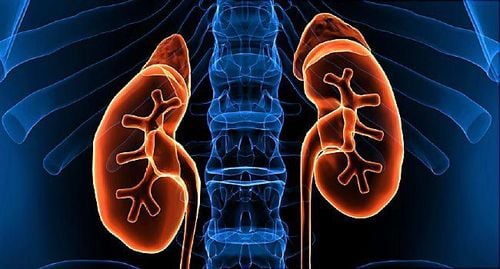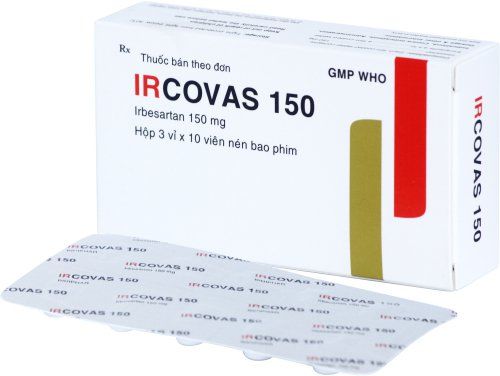This is an automatically translated article.
Cozaar blood pressure medicine 50mg is used to treat hypertension, kidney disease in hypertensive patients with type 2 diabetes or with proteinuria, reducing the risk of cardiovascular morbidity and mortality in hypertensive patients. left ventricular hypertrophy.
1. Effects of the drug Cozaar 50mg
Blood pressure medicine Cozaar 50mg has the main active ingredient Losartan potassium. Cozaar is available as a film-coated tablet, with a strength of 50mg. Losartan is an angiotensin II receptor antagonist. Angiotensin II binds to the AT1 receptor in a variety of tissues such as vascular smooth muscle, adrenal, kidney, and heart, and exerts potent vasoconstrictor and aldosterone-secreting effects. Angiotensin II stimulates smooth muscle cell proliferation.
Losartan and its pharmacologically active carboxylic acid metabolite (E-3174) block all of the above physiological effects of Angiotensin II. Losartan binds selectively to the AT1 receptor, without binding to or blocking other hormone receptors or ion channels important in cardiovascular regulation. Losartan does not inhibit angiotensin converting enzyme, which breaks down bradykinin. Therefore, effects not related to AT1 receptor blockade, such as bradykinin-mediated potentiation or edematous effects, were not observed with losartan use.
Losartan inhibits response to angiotensin I and II without affecting response to bradykinin. In contrast, ACE inhibitors block the response to angiotensin I and increase the response to bradykinin without inhibiting the response to angiotensin II.
In hypertensive patients without diabetes and with proteinuria, Losartan markedly reduced proteinuria, decreased albumin and IgG excretion. In addition, Losartan reduces serum uric acid, an effect that persists with prolonged use of Losartan.
In patients with left ventricular failure, Losartan doses of 25 mg and 50 mg produced positive hemodynamic and neurohormonal effects, characterized by a decrease in pulmonary capillary pressure, vascular resistance, and mean global blood pressure. body, decreased heart rate and blood levels of aldosterone and norepinephrine. The reduction in blood pressure in these patients with heart failure was dose dependent with losartan.
2. Indications and contraindications for the use of Cozaar 50mg
Indications for drug use:
Treatment of hypertension. Adult hypertensive patients have left ventricular hypertrophy, which reduces the risk of cardiovascular morbidity and mortality. Treatment of kidney disease in adult patients with hypertension and type 2 diabetes, proteinuria greater than 0.5g/day. Using Cozaar drug helps to slow down the progression of kidney disease, reduce proteinuria. Treatment of heart failure: Cozaar 50mg can be used in combination treatment of heart failure. The use of the drug is contraindicated in the following cases:
Allergy or hypersensitivity to Losartan or any of the excipients listed in the composition of the drug Cozaar. Pregnant women Severe liver failure. Renal failure: Blood creatinine ≥ 250 mmol/liter, creatinine clearance ≤ 30 ml/min, blood potassium ≥ 5 mmol/liter.
3. How to take blood pressure medicine Cozaar 50mg
Cozaar 50mg drug is taken orally, the time of taking the drug is not related to the meal. Cozaar can be used alone or in combination with other antihypertensive agents.
Dosage for hypertension:
Dosage of Cozaar depends on the patient's condition and response to the disease. The initial and maintenance dose is usually 50 mg once daily. The maximum therapeutic effect is usually achieved 3-6 weeks after starting the drug. The dose may be increased to 100 mg once daily for some patients. For patients with volume depletion (eg, on high-dose diuretics) or with hepatic impairment, consider an initial dose of Cozaar of 25 mg once daily. There is no need to adjust the starting dose of Cozaar in the elderly or in patients with renal impairment including those on hemodialysis. If blood pressure cannot be controlled with the dose used, after 1-2 months, the dose of Cozaar used should be adjusted. In adult hypertensive patients with left ventricular hypertrophy, which reduces the risk of cardiovascular morbidity and mortality:
The starting dose of Cozaar is usually 50 mg once daily. The dose of Cozaar may be increased to 100 mg once daily or in combination with low-dose hydrochlorothiazide depending on the individual patient's response to blood pressure therapy. Treatment of kidney disease in hypertensive patients with type 2 diabetes, with proteinuria greater than 0.5g/day:
The starting dose of Cozaar is 50mg x 1 time/day. The dose of Cozaar may be increased to 100 mg once daily depending on blood pressure response or in combination with other antihypertensive agents. Cozaar 50mg overdose and management:
Currently, data on Cozaar overdose in humans are limited. The most common manifestations of overdose are hypotension and tachycardia; bradycardia may occur due to parasympathetic (vagal) nerve stimulation. If symptoms of hypotension occur with an overdose of Cozaar 50mg, supportive treatment should be instituted. Losartan or its active metabolite cannot be removed by hemodialysis. What to do when you miss a dose of Cozaar 50mg:
If you miss a dose of Cozaar, take it as soon as possible. However, if it is almost time for your next dose, skip the missed dose of Cozaar 50mg and take your next dose at the scheduled time. Note that a double dose of Cozaar should not be taken.
4. Undesirable effects when using Cozaar 50mg
Undesirable effects when using Cozaar drugs are usually mild and subside with time.
Cardiovascular system: Hypotension, palpitations, chest pain. Less common are orthostatic hypotension, sinus bradycardia or tachycardia, Digestive system: Diarrhea, dyspepsia, abdominal pain, nausea, anorexia, flatulence, constipation, gastritis. Musculoskeletal system: Back pain, myalgia, cramps, paresthesias, tremors, muscle weakness. Nervous system: Fatigue, dizziness, insomnia, headache, migraine, anxiety, sleep disturbance. Respiratory system: Nasal congestion, cough, sinusitis, upper respiratory tract infection, shortness of breath, bronchitis, nosebleed. Immune system: Ban Henoch-Schoenlein. Blood and lymphatic system: Decrease in hemoglobin and hematocrit, thrombocytopenia. Immune system: Anaphylactic reactions, angioedema, laryngeal and glottis edema, edema of the face, lips, throat or tongue. Skin and subcutaneous tissue: Pruritus, urticaria, photosensitivity, generalized erythema. When experiencing side effects of Cozaar, it is necessary to stop using the drug and go to a medical facility for timely treatment. Undesirable effects usually disappear when the dose is reduced or the use of Cozaar is stopped.
5. Some notes when using Cozaar 50mg
Patients with hypotension and water or electrolyte imbalance: In patients with hypovolemia while taking Cozaar, symptomatic hypotension may occur. This condition should be treated before taking Cozaar.
Hepatic impairment: Losartan plasma concentrations are significantly increased in cirrhotic patients, requiring a lower dose of Cozaar in these patients.
Impaired Renal Function: As a consequence of inhibition of the renin-angiotensin system, changes in renal function, including renal failure, have been reported in susceptible patients, which are reversible upon discontinuation. drug use.
Patients with unilateral or bilateral renal artery stenosis, who have only one kidney, are at increased risk of undesirable effects such as increased blood urea or creatinine. Close monitoring is required during the use of Cozaar.
Pediatric use of Cozaar: The antihypertensive effect of Cozaar in pediatric patients > 1 month to 16 years of age with hypertension has been demonstrated. In pediatric patients weighing 20-<50 kg, the recommended dose is 25 mg once daily, which can be increased to a maximum dose of 50 mg once daily. In pediatric patients > 50 kg, the starting dose is 50 mg/time/day, which can be increased to a maximum dose of 100 mg/time/day. In the case of pediatric patients with hypovolaemia, this should be corrected before administering Cozaar. Adverse reactions occurring in pediatric patients when using Cozaar are similar to those in adults. Its use is not recommended in pediatric patients with glomerular filtration rate <30ml/min/1.73m2, hepatic impairment or in neonates because of insufficient data.
Ability to drive and use machines: Some undesirable effects of Cozaar have been reported, which may affect the ability to drive and use machines. Individual response to Cozaar is different.
Pregnant women: Using Cozaar during the second and third trimesters of pregnancy can cause hypotension, oligohydramnios, oliguria, craniofacial deformity and even infant death. Stop taking Cozaar as soon as possible when pregnancy is detected.
Lactation: It is not known whether Losartan is excreted in human milk. Because of the potential for adverse effects in nursing infants, a decision should be made whether to discontinue Cozaar or discontinue nursing, depending on the importance of Cozaar use to the mother.
6. Drug interactions
Concomitant use of Cozaar with potassium-sparing diuretics (such as Spironolactone, Triamterene, Amiloride), salt substitutes containing potassium or potassium supplements may lead to hyperkalemia. Nonsteroidal anti-inflammatory drugs, especially selective COX-2 antagonists, may reduce the antihypertensive effect of ACE inhibitors. In addition, concomitant use of this drug with Losartan may cause renal failure, renal function should be monitored when Cozaar Rifampicin, Carbamazepine, Phenytoin are used to reduce the concentration of Losartan and its metabolites in the plasma when used concomitantly. Losartan enhances the effect of drugs Carvedilol, hypoglycemic drugs, potassium-sparing diuretics, Lithium, Rituximab. Above is information about the drug Cozaar 50mg, patients need to carefully read the instructions for storing the drug on the package and the instruction sheet. Check the expiration date before taking the medicine. When the drug is no longer in use, it should be collected and disposed of according to the manufacturer's instructions.
Please dial HOTLINE for more information or register for an appointment HERE. Download MyVinmec app to make appointments faster and to manage your bookings easily.













